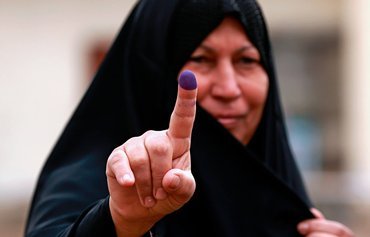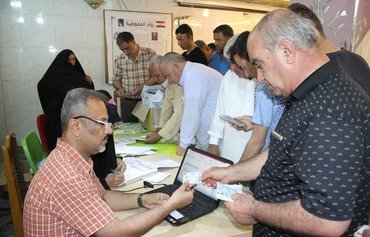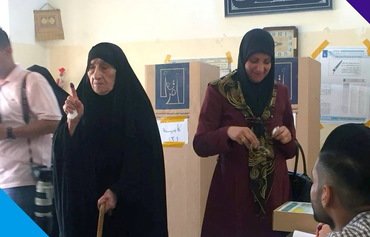The Iraqi government will hold parliamentary and provincial elections on schedule next year, despite significant security, political and logistical challenges, officials told Diyaruna.
The Iraqi parliament has set the upcoming parliamentary and local provincial council elections for May 15th, Prime Minister Haider al-Abbadi announced earlier this month.
The federal government has pledged to provide the requisite security provisions for the elections and will seek to return displaced residents to their areas.
Only political parties that do not have armed factions will be allowed to participate in the elections, according to the Iraqi government.
Election timetable in place
The Independent High Electoral Commission "has put in place a timetable for the elections based on the government’s deadline", said electoral commission council chairman Maan al-Hitawi.
The registration centres and electoral commission offices are currently distributing electronic voter cards to civilians and security personnel after they submitted their biometric details for registration, he told Diyaruna.
The electoral commission also is operating in areas recently liberated from the "Islamic State of Iraq and Syria" (ISIS) in order to prepare residents of these areas to take part in the elections, he said.
Al-Hitawi said he does not foresee the postponement of the elections "for any reason, as the constitutional timetable for the elections is the central factor when it comes to the election process".
But he also stressed that the electoral commission is an executive body tasked with preparing for the elections, and that if the government decides on a different date, the commission will abide by it.
Overcoming challenges
The upcoming election poses significant challenges, al-Hitawi said, but "most of those challenges were already present" when the electoral commission was first formed in 2004.
The commission has managed to overcome security and logistical challenges and successfully oversee elections by preparing for obstacles and putting contingency plans in place, he said.
"These challenges were manifest during the current election cycle, as the Iraqi parliament delayed ratifying the new election law which the electoral commission relies on to conduct elections," he said.
Various political parties have criticised the law upon which the 2014 elections were based, prompting the prime minister to propose new legislation, he said.
"In the event that parliament fails to ratify the new legislation, which is still under parliamentary discussion, the electoral commission is ready to go ahead with elections according to the old legislation since it is still valid," he said.
The issue of displacement
Internally displaced persons (IDPs) in Anbar province pose an additional challenge to the upcoming elections, Anbar provincial council member Taha Abdul-Ghani told Diyaruna.
Iraqi forces are still battling remaining pockets of ISIS fighters in western Anbar so displacement is still ongoing, he said, noting that 87 IDP camps in the province are accommodating those who fled from different cities and districts.
It is possible to return most displaced residents to their areas before the elections if the Ministry of Displacement and Migration redoubles its efforts, he said, and if local and federal authorities work together.
Cities recently liberated from ISIS, such as al-Qaim, will be ready to host elections on schedule, he said, as it was not heavily damaged by military operations and did not experience large waves of displacement.
Abdul Ghani predicted large voter turnout in Anbar province as "local residents seek political change after the suffering they recently endured".
"The upcoming legislative and provincial elections will be a real opportunity for Iraqi voters to make their voice heard regarding the political landscape," political analyst Ahmed al-Sharifi told Diyaruna.

![Iraq's Independent High Electoral Commission prepares for next year's elections by distributing electronic voter cards. [Photo courtesy of Office of the Electoral Commission in Baghdad]](/cnmi_di/images/2017/11/17/10320-Iraq-Baghdad-elections-600_384.jpg)






